MIEM Students Demonstrate Google Glass Analogue and Portable Cardiograph at All-Russia Science Festival
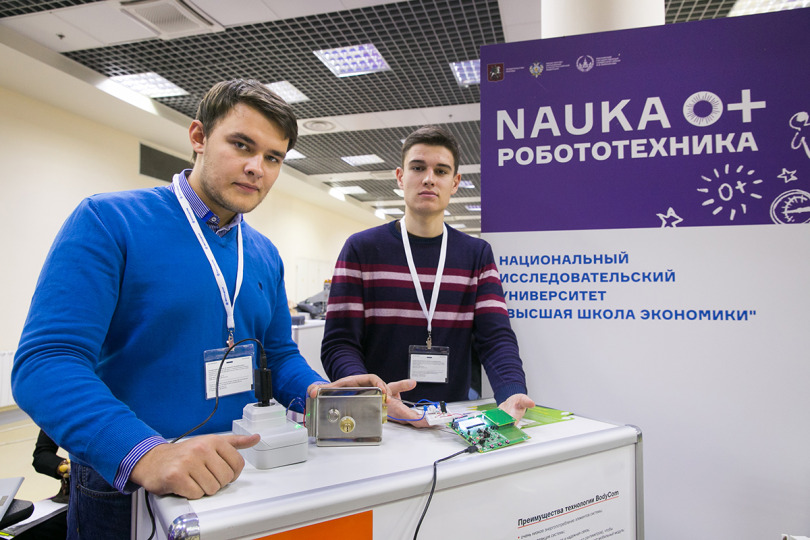
Undergraduate and postgraduate students at the HSE Moscow Institute of Electronics and Mathematics (MIEM) recently presented their innovations at the All-Russia Science Festival (NAUKA+). Among them were ‘intelligent electric outlets’, which eliminate worries about irons being left plugged in, and a device for measuring eye fatigue.
‘Smart Energy’ Complex*
This system allows for comprehensive recording of energy consumption in the home and workplace. Operation of the entire system can be carried out on three levels. Basic functionality allows statistics to be gathered on the individual power consumption of devices connected to the power grid. At the second level, users can choose between schemes to optimize overall power consumption by distributing usage to times when rates are less expensive. At the third level, the system controls the entire network based on the selected scheme, connecting only authorized devices. The entire system is controlled via a wireless sensor network or the internet.
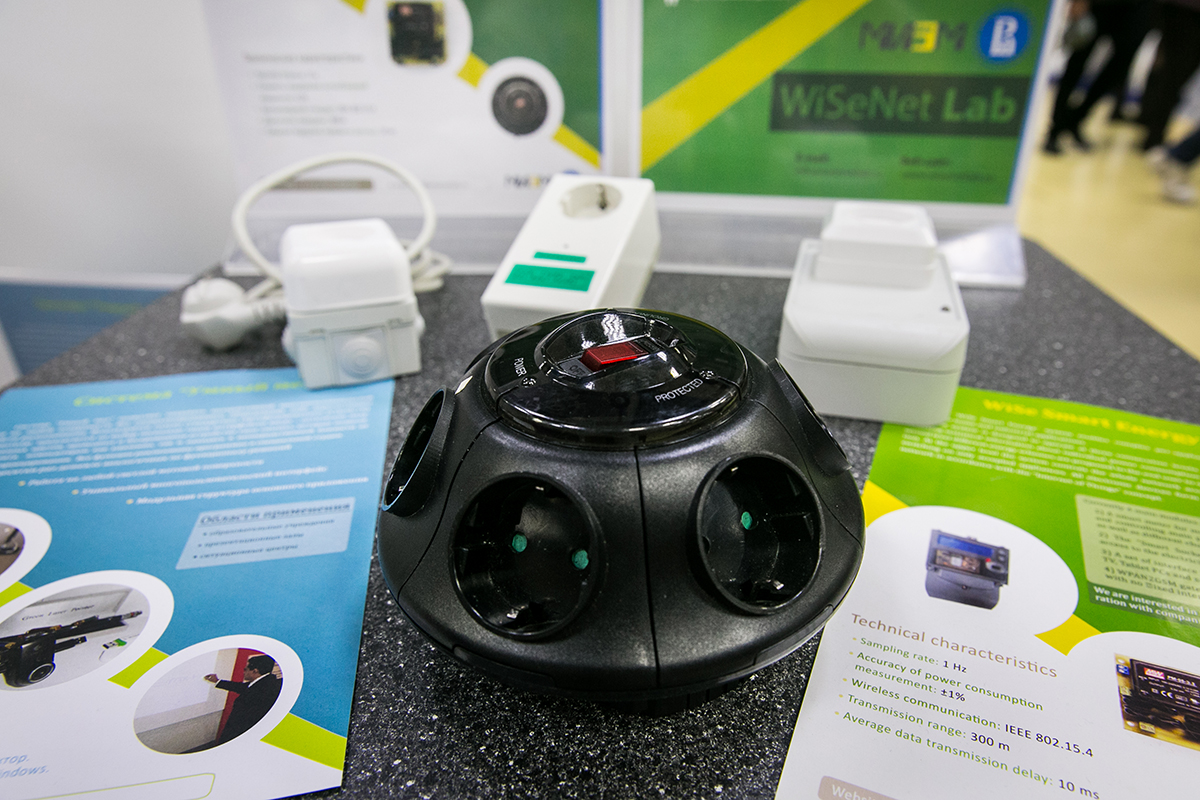
‘Intelligent electric outlets’
How does it work?
This system has several prototypes. First, there are the ‘intelligent electric outlets’ that allow users to control access to power wirelessly (WiFi, 2G, and so on). For example, a person may leave his or her home and cannot remember whether the iron is unplugged. Intelligent electric outlets can be controlled, as well as turned on or off remotely. All intelligent outlets are equipped with fuses to protect against fire. Smart outlets can come in different types – extensions and single outlets – and they can be mounted on the wall or act as switches. The adapter on the socket allows users to determine which devices are included in the network and how much electricity they consume; it also offers advice on energy savings. Accordingly, users have the opportunity to exercise control over their own rate plan and manage energy use in their homes. For example, if a user wants to turn on a washing machine during a time with higher electricity rates, the system will ask whether to continue.
Second, the ‘Smart meter’ allows for overall energy consumption to be monitored and devices connected to the power grid to be identified.
As part of the ‘Smart energy’ complex, modules were also developed to display information on mobile devices, tablets and Smart TV, as well as a WPAN2GSM gateway for interaction between local sensor networks and the global network (internet, GSM).
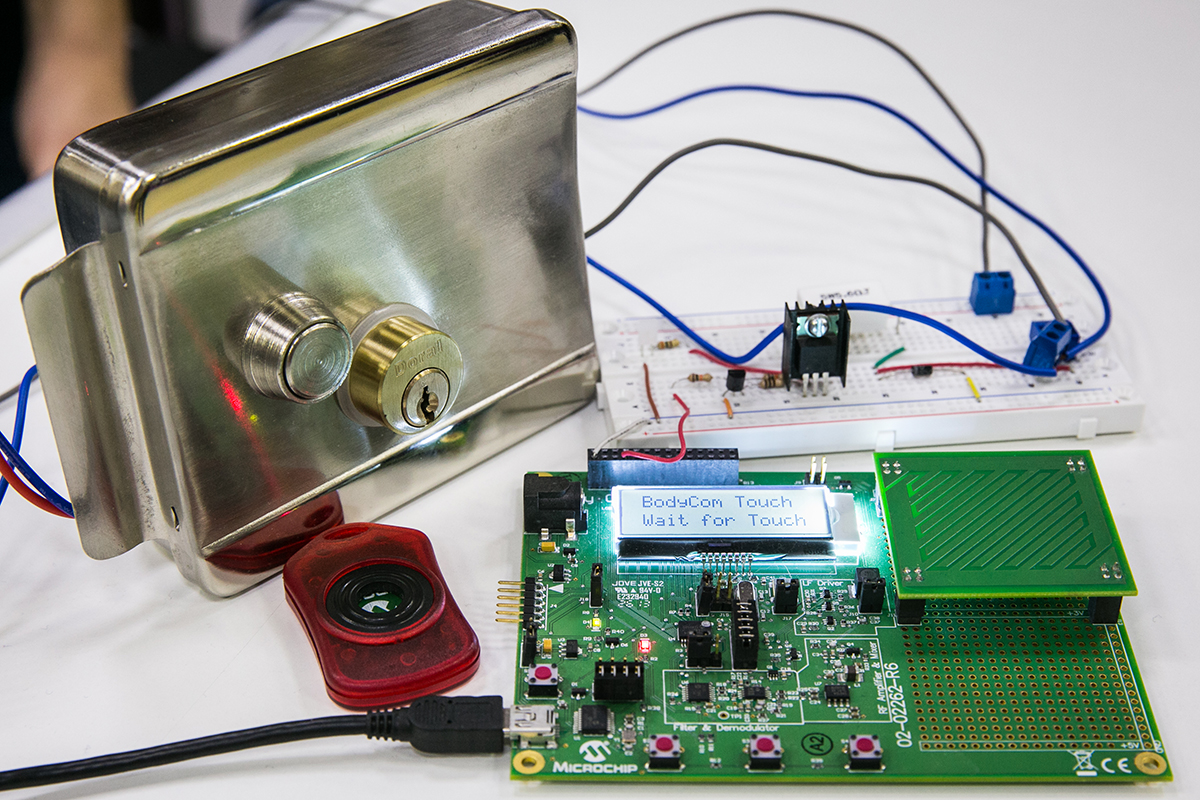
BodyCom system
Access control and management system using BodyCom technology
BodyCom is a wireless communication technology that uses the ability to transfer data on the human body. Both a software and hardware system, it is designed to protect premises from unauthorized access.
How does it work?
Small tracking indicators are placed in the pocket of a person who comes to the door and places his or her finger on the ‘smart lock’, which opens automatically (i.e., without a key). Unlike classical biometric systems that identify a person through fingerprints or retinal patterns, this system determines a person’s body resistance and transmits a digital signal from the tracking indicator through the body to the lock. The advantages of BodyCom technology are the low power consumption of its components, the system’s rapid response, a relatively stable and reliable connection, a restricted field (a few centimetres) to identify the touch of the person wearing the mobile unit, as well as its low cost and ease of use.
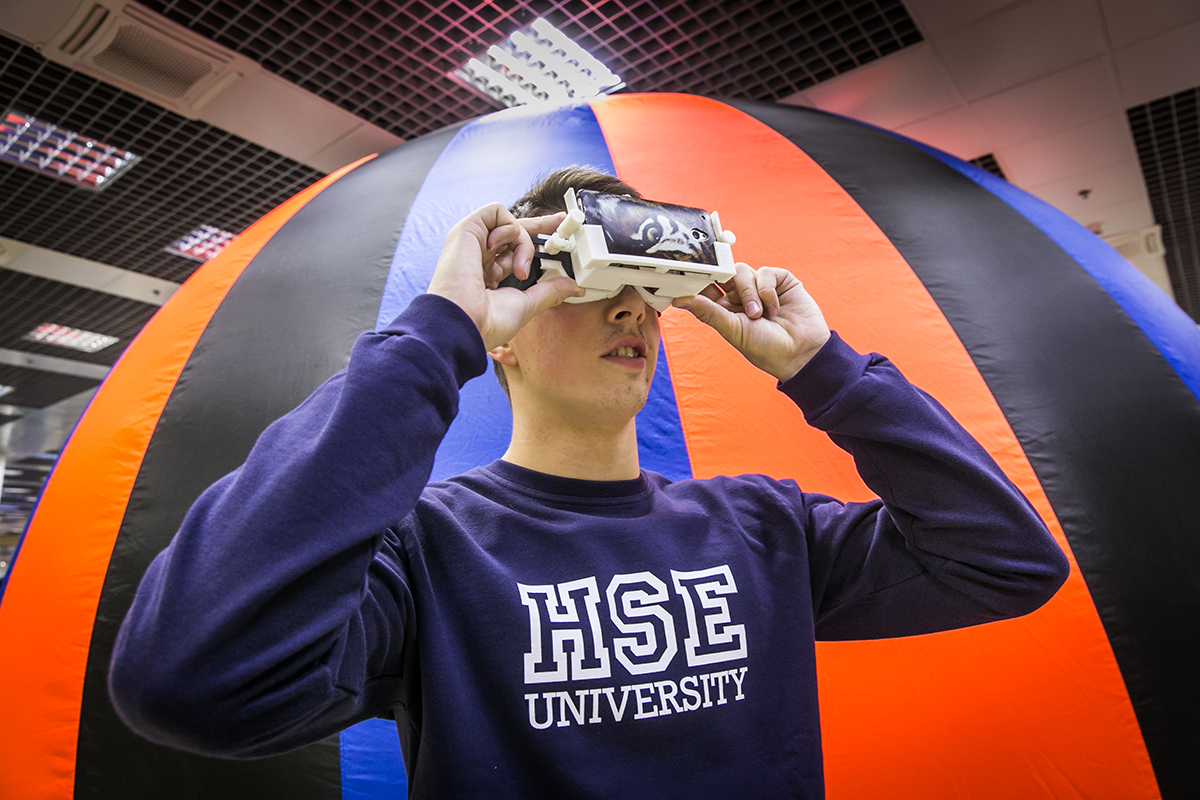
Glasses with a smartphone for virtual reality
Smartphone-based virtual reality system
How does it work?
A 3D-printer is used to print glasses (the 3D-glasses are developed), insert the lens and the smartphone (a smartphone holder is provided with the glasses), and then a special free application is downloaded to connect to the phone joystick and plunge into virtual reality. This system is actually an analogue of Google Glass, only much less expensive.
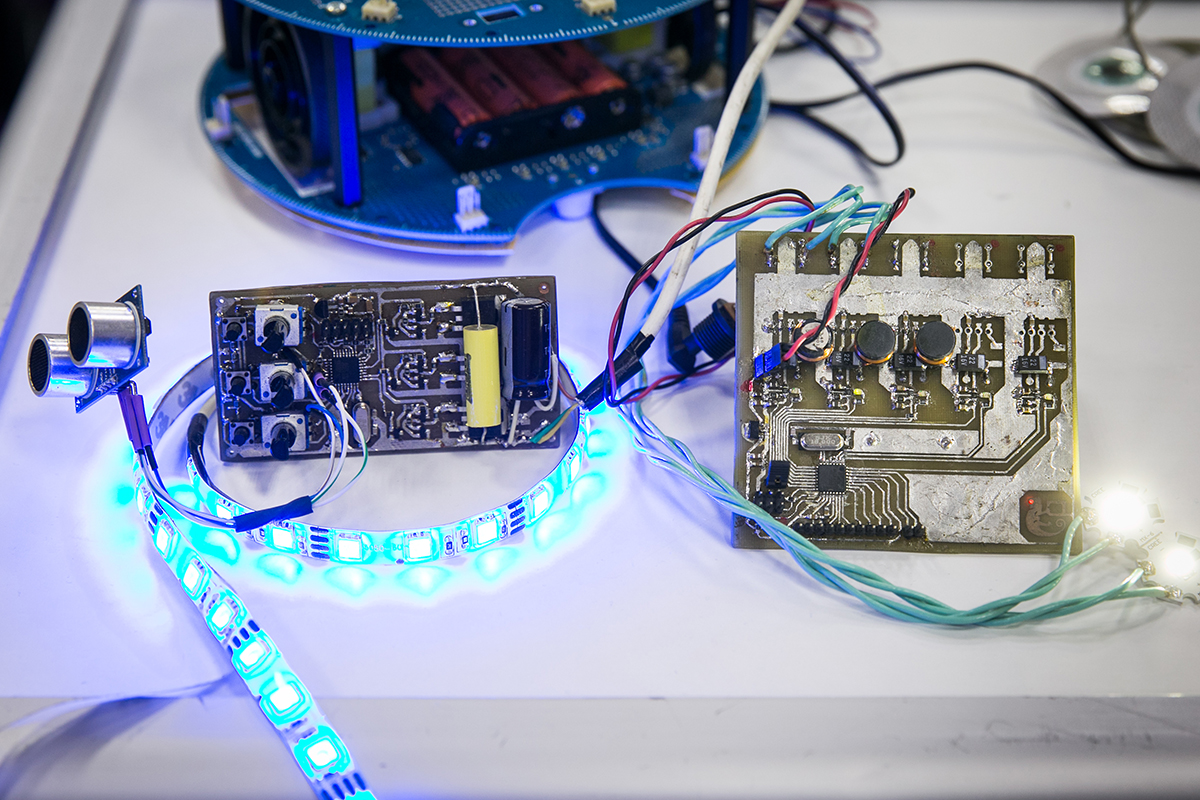
Circuit cards and diodes of the ‘Smart light’ system
‘Smart light’ project**
How does it work?
A lighting controller is a single-chip microcomputer that allows a person to control any light source using light emitting diodes (LED lamps, strips, etc.). The idea is that several of these devices can be collected to create an entire intelligent system. For example, if a person enters a house, the sensors will detect movement and the ‘smart light’ system will turn on lighting in the entryway. The system comprises approximately 65,535 light modes (shades). A user can select a programme, for example, based on the time of day, mood and so on.
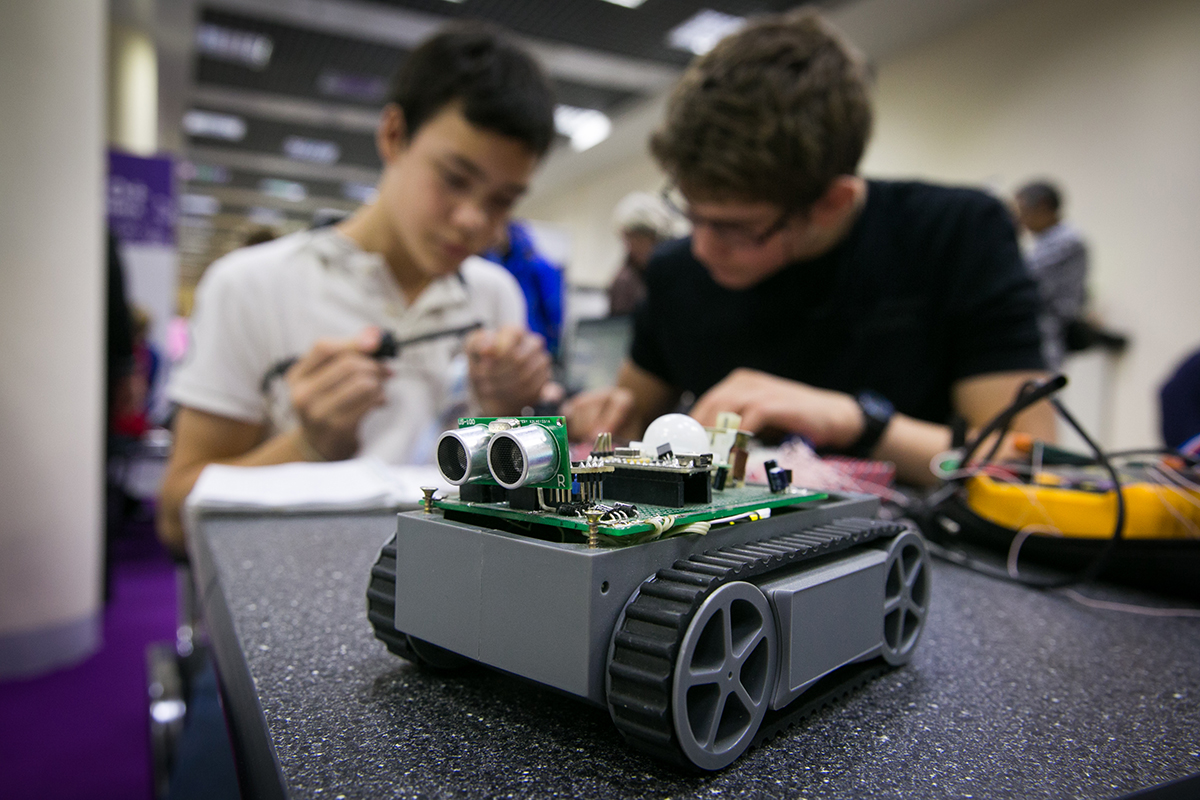
Robot tank
‘Robot tank’, a final project for a group of students in the Department of Electronic Engineering
How does it work?
Unlike most robotics machines that are controlled remotely, the robot tank ‘lives by its own brains’. In other words, it can autonomously (automatically) find a way out of a maze, navigate around obstacles, and pull back (in case an object is falling in front of it). If one imbeds a search algorithm in this robot, to discover minerals for example, it will search for them.
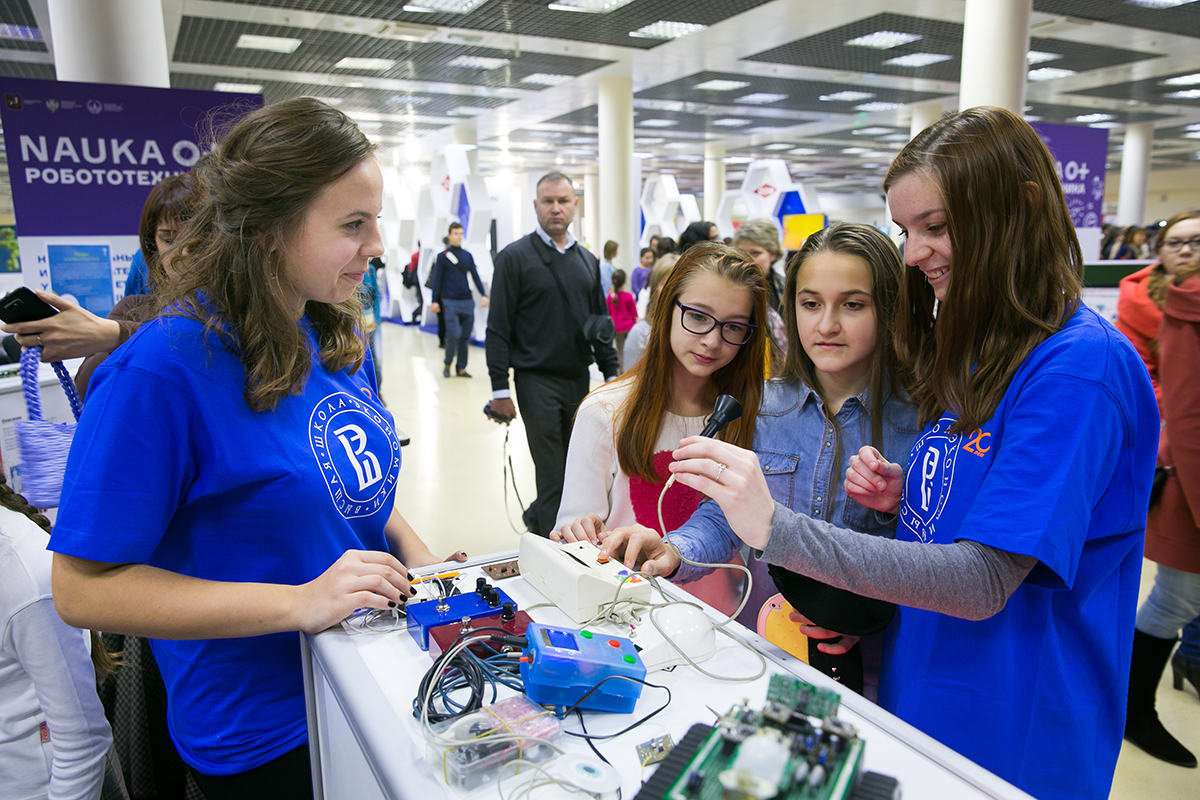
Process to measure eye fatigue
Device to measure eye fatigue
How does it work?
The device allows for assessment of human eye fatigue from any screen (e.g., when working at a computer, watching television, etc.). Eye testing is automatic (stimulating agents are used precisely of those parts of the spectrum that are perceived by the cones of the visual apparatus). Upon completion of the test the device displays numbers: below 35 is very bad (the eye perceives almost no information); 40 to 55 is a good indicator.
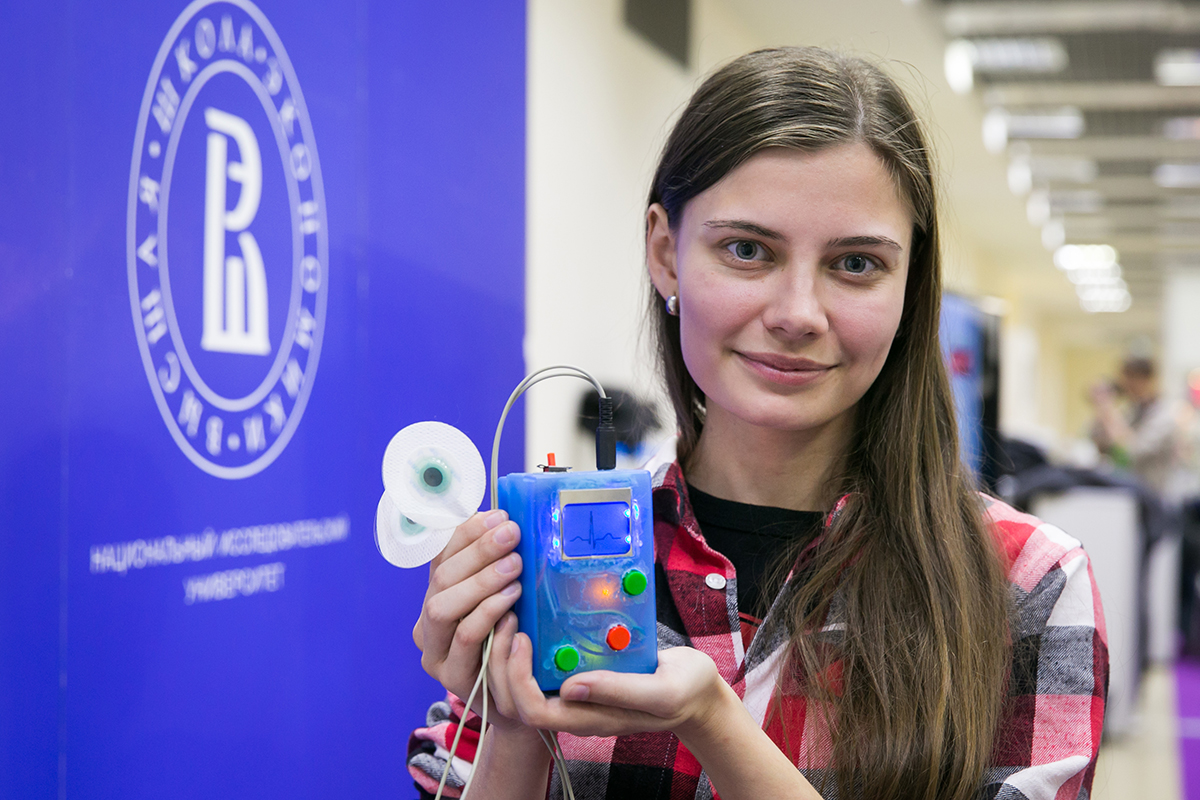
Maria Pavlova, Master’s student in the Electronics Engineering programme and developer of the portable cardiograph
Portable cardiograph
How does it work?
The device allows users to take a cardiogram for several minutes at home. It then analyzes the data and in the event there are any deviations, it makes recommendations. For ease of use, the device has only three buttons (‘On/Off’, ‘Memory’ and ‘Make Diagnosis’). The resulting cardiogram can easily be printed or saved on a flash drive and sent by email to a doctor.
* Hereinafter — developments of Alexey Rolich, lead engineer at the 3D Visualization and Computer Graphics Laboratory, as well as undergraduate and postgraduate students of the Department of Computer Engineering at MIEM HSE
** Hereinafter — developments of Konstantin Bogachyov, Senior Lecturer at the HSE Moscow Institute of Electronics and Mathematics (MIEM), and students of Department of Electronic Engineering at MIEM HSE
See also:
HSE Students Among Top 10 Finalists of POC CTF
Five students from the HSE Tikhonov Moscow Institute of Electronics and Mathematics (MIEM HSE) have ranked among the top ten finalists of the major cybersecurity competition POC CTF. The final, held in Seoul (Republic of Korea), brought together 50 students and professionals representing leading global companies and universities in the field of cybersecurity.
HSE University at VK Fest: VR Games and Emotion Recognition
On July 13-14, 2024, the annual large-scale VKontakte festival took place at Moscow’s Luzhniki Stadium. HSE University, as usual, participated in the event. The university's tent featured a variety of activities, including emotion recognition challenge, quizzes about artificial intelligence, IT career testing, a smile detector, VR gaming, and a blue tractor equipped with a smart sprinkler system.
Russian Culture Festival Held for the First Time at HSE University
In early March, the HSE building on Pokrovsky Bulvar hosted theRussian Culture Day Festival. The event was organised by the HSE Department of Internationalisation. International students participated in quizzes, lectures, and workshops. They also had the opportunity to taste a traditional Russian dish—blini with jam.
‘People and Society’: HSE University Hosts NAUKA 0+ All-Russian Festival
On October 7, a ‘People and Society’ thematic platform opened at HSE University’s Cultural Centre as part of the NAUKA 0+ science festival. Guests were able to explore the world of scientific discoveries and interesting experiments, as well as listen to a series of lectures from leading HSE experts.
Gaming and Communication: HSE University at VK Fest in Gorky Park
This weekend VK Fest took place in Gorky Park — an open-air spectacular featuring musicians, bloggers, and speakers, as well as entertainment and educational projects for a young audience. The 2023 Festival took place in five cities: Vladivostok, Novosibirsk, St. Petersburg, Sochi and Moscow. This is the second time VK Fest has been held in Moscow, and both times HSE University has taken part in the event.
K-pop, Chinese Calligraphy, Indian Cuisine and Azerbaijani Songs: All of Asia Visits HSE University
In February 2023, the HSE University Cultural Centre hosted the festival ‘Colour of Asia: From Riyadh to Tokyo’ coordinated by the university’s Korean Club. A total of 24 student organisations took part in arranging the festival, including national, environmental, and charity clubs.
HSE MIEM Celebrates 60 Years at the Forefront of Electronics and Mathematics
Students, staff and graduates of the HSE Tikhonov Moscow Institute of Electronics and Mathematics (MIEM HSE), university leaders, representatives of HSE University faculties and partner companies gathered at the HSE Culture Centre on October 14 to celebrate the 60th anniversary of the institute.
Alexei Vagov: ‘Metamaterials Should Serve People'
The Centre for Quantum Metamaterials is one of the new international laboratories that will be launched at MIEM, HSE University, in 2022. Alexei Vagov, Head of the Centre, speaks about the main areas of the Centre’s research, its team, and future research cooperation.
HSE Gets in on the Show: The Creative Present and the 'Fear of the Future'
The Telling Stories festival, organised by the Faculty of Communications, Media, and Design, has come to an end at HSE University. During two days, anyone could attend open lectures, discussions, master classes, performances, concerts, exhibitions, and screenings. Experts discussed the state of creative industries and tried to outline an image of the future by understanding the main challenges, prospects, and anxieties it presents.
HSE to Launch a Satellite into Space
By the end of 2020, HSE scientists will launch their own satellite into low Earth orbit, which will allow them to observe the Earth via the satellite’s remote sensors. To design and create the satellite, specialists and students of MIEM HSE and the HSE Lyceum worked closely with the Sputniks company, the Sirius Education Centre, and Scanex.


